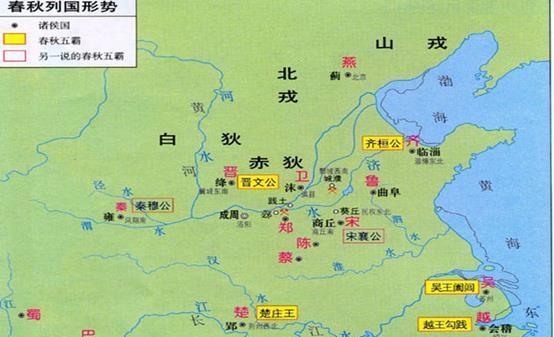After the Battle of Chengpu, the Jin state dominated the Central Plains. In 628 BC, Duke Wen of Jin fell ill and died, and Duke Xiang of Jin succeeded to the throne. Duke Mu of Qin had ambitions to dominate the Central Plains, and at this time, Qin Dafu Qizi, who was guarding zheng guoshu, was already in charge of the key to the north gate of Zheng capital, and sent someone to report that Mu Gong had sent troops to attack Zheng. Taking advantage of Jin's funeral, Qin Mugong did not listen to the dissuasion of the chancellor Uncle Jian and others, and insisted on sending Meng Mingshi and other generals to lead an army to secretly attack Zheng Guo through Mount Jin.

In the winter of 628 BC, Meng Mingshi, Xi Qishu, and Bai Yibing led the Qin army under the orders of Qin Mugong to sneak across the Kunshan Mountains of Jin. When The Jin State Secretary of State received the news, he said to the Duke xiang of Jin: "The State of Qin, in violation of Uncle Jian's advice, has toiled and hurt the people and their wealth because they coveted the land of the Central Plains, and attacked the remote countries. We must destroy it, or we will leave a curse. Sincerely ask the lord to lead the army to attack the Qin army. Luan Zhi, the commander of the lower army, objected: "With the help of the Qin State, the Xianjun (that is, the Duke Wen of Jin) was able to return to the throne, and if we attack the Qin State, wouldn't we disobey the will of the Xianjun?" Xianxun replied, "Instead of grieving for the loss of our country, Qin took the opportunity to attack our country with the same surname, and they were so rude, what kind of charity do we talk to them about?" I have heard that 'one day of the enemy, several generations of troubles', for the sake of our descendants, cannot be regarded as a violation of the will of the ancestors. Providence is so, and it is unlucky not to follow Providence! The Duke of Jin then agreed to send troops.
In the spring of 627 BC, Duke Xiang of Jin ordered the mourning clothes to be dyed black, and led the Jin army south across the Yellow River with Xianxun as the marshal of the Chinese army, controlled the dangerous section of the northern foothills of the KunShan Mountains, and united with Jiang Rong's army, the Jin army ambushed on the plain, and Jiang Rong's army was lying in a valley, and a bag-shaped formation was laid out to wait for the Qin army.
At this time, the Qin army had arrived in the territory of the State of Shui, and the merchant Of Zheng Guo, Xiang Gao, was selling cattle in the Country of Shui, and he judged that the Qin division would attack Zheng and decided to make some sacrifices to save the State of Zheng. So he led twelve cows under the false pretense of Zheng Jun to reward the Qin army. Meng Mingshi and the other three marshals did not know whether it was false, and thought that Zheng Guo already knew the news of the Qin army's attack and was prepared for prevention, they were afraid that they would not be able to attack Zheng, and there was no long-term replenishment of military supplies for the siege of Zheng Guo, so they abandoned the plan to cut down Zheng, and after destroying the slippery country, they withdrew their troops back to Qin.
Meng Mingshi knew nothing about the Jin army's ambush at Kunshan, and the Qin army naturally entered the encirclement of the Jin army. When the Qin army all entered the canyon pass in the northern foothills of the Kunshan Mountains, the Xianxun Order flag was waved, and the Jin army and Jiang Rong army that were ambushed on both sides rushed out and killed the Qin army. Where did the Qin army have time to deploy defensive resistance? Suddenly, they were swept to pieces, and the military vehicles could not maneuver against the enemy, and finally the entire army was destroyed, and none of them had to get out, and Meng Mingshi and the other three marshals were all taken prisoner.
The Battle of Kun ended with the complete annihilation of the Qin army.
The Battle of Kun was an important battle in the history of the Spring and Autumn Period. Its outbreak was not accidental, but the result of the conflict of fundamental strategic interests between Qin and Jin. In the Battle of Kun, Qin lightly launched his troops, went deep alone, attacked thousands of miles away, and suffered an unprecedented defeat. Since then, the qin state's road to the east into the Central Plains has been stifled by the Jin state, and Qin Mugong had to use troops to the west, "Benefiting the country twelve, opening up thousands of miles of land, and dominating the Western Rong", this battle marked the change of the relationship between Jin and Qin from friendship to feud.
Immediately after the Battle of Kun, the State of Qin released Dou Ke, the Chu captured in the Battle of Tan, and allied with the State of Chu to jointly resist the Jin. After that, Qin adopted the strategy of uniting chu to control Jin, which became a major problem for the Jin state in the West. In order to maintain its hegemonic position, the Jin state also had to deal with the challenges of the two great powers of Qin and Chu in the west and south at the same time. Therefore, although the State of Chu did not participate in the Battle of Kun, it was the biggest beneficiary of the Battle of Kun.